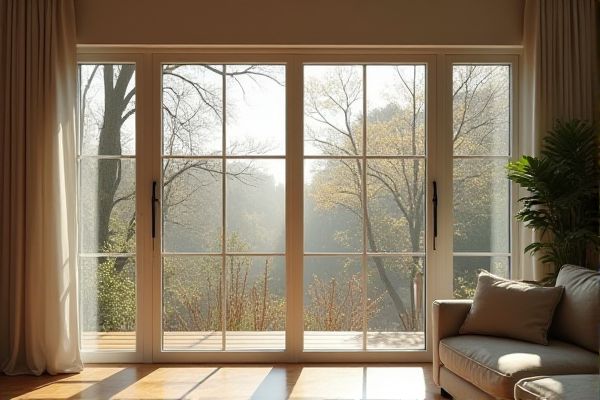
Sliding windows offer easy operation and space-saving benefits by gliding horizontally along a track, making them ideal for rooms where exterior space is limited. Casement windows, hinged at the side and opening outward like a door, provide superior ventilation and energy efficiency, enhancing your home's comfort and style; explore the rest of the article to discover which window type suits your needs best.
Table of Comparison
| Feature | Sliding Windows | Casement Windows |
|---|---|---|
| Opening Mechanism | Horizontal sliding sashes | Side-hinged, swing outward or inward |
| Ventilation | Moderate air flow | Maximum air flow when fully open |
| Space Efficiency | Ideal for tight spaces; no outward projection | Requires exterior clearance for opening |
| Installation Cost | Generally lower cost | Typically higher cost due to hardware |
| Maintenance | Track cleaning and lubrication needed | Hinges and crank mechanism require upkeep |
| Energy Efficiency | Good, often double-glazed | Superior sealing, better insulation |
| Security | Basic locking mechanisms | Enhanced security with multi-point locks |
| Visibility | Large uninterrupted glass panels | May have frame dividing glass sections |
Introduction to Sliding and Casement Windows
Sliding windows feature horizontal sashes that glide along a track, offering easy operation and unobstructed views, ideal for modern and contemporary homes. Casement windows are hinged at the sides and open outward like a door, providing excellent ventilation and a tight seal against air infiltration. Choosing between sliding and casement windows depends on factors like space availability, style preference, and desired airflow efficiency.
Key Differences Between Sliding and Casement Windows
Sliding windows operate by gliding horizontally along a track, offering ease of use and unobstructed views, while casement windows swing outward like a door, providing better ventilation and airtight seals. Sliding windows are ideal for wide openings and low maintenance, whereas casement windows excel in energy efficiency and enhanced security due to their locking mechanisms. Your choice depends on prioritizing ease of cleaning and panoramic views versus superior airflow and insulation.
Design and Aesthetic Appeal
Sliding windows offer a sleek, modern design characterized by horizontal sashes that glide smoothly within the frame, complementing contemporary architectural styles. Casement windows feature a hinged design that opens outward, providing an elegant, traditional appearance while allowing for unobstructed views and enhanced ventilation. Both types enhance aesthetic appeal, with sliding windows emphasizing minimalism and casements offering classic charm and versatility in design.
Energy Efficiency Comparison
Sliding windows typically have fewer seals and more exposed frame area, which can result in lower energy efficiency compared to casement windows. Casement windows create a tighter seal when closed by pressing firmly against the frame, minimizing air leakage and improving insulation performance. Studies show casement windows can reduce energy loss by up to 30% compared to sliding windows, making them a better option for enhanced thermal efficiency.
Ventilation Capabilities
Sliding windows offer moderate ventilation by allowing one sash to glide open horizontally, providing a narrow airflow channel but limiting the size of the opening. Casement windows provide superior ventilation capabilities, as their hinged design allows the sash to swing outward fully, maximizing fresh air intake and directing breezes into the home. The wider opening of casement windows also facilitates better air circulation compared to the restricted aperture of sliding windows.
Space and Installation Requirements
Sliding windows are ideal for areas with limited exterior space since their sashes slide horizontally within the frame, requiring no additional clearance outside the window. Casement windows need more space to fully open outward on hinges, making them less suitable for locations near walkways or patios. Installation of sliding windows often involves simpler framing adjustments compared to casement windows, which require sturdy support for the hinged mechanism and clearance for the sash swing.
Durability and Maintenance Needs
Sliding windows feature a simple track mechanism that offers moderate durability but requires regular cleaning to prevent dirt buildup and ensure smooth operation. Casement windows have robust hinges and a tight seal, providing superior durability and better resistance to weather, resulting in lower maintenance needs over time. Both types benefit from routine inspections, but casement windows typically demand less frequent repairs due to their sturdier construction and enhanced sealing capabilities.
Cost Analysis: Sliding vs Casement Windows
Sliding windows often cost less upfront compared to casement windows due to simpler design and easier installation. Casement windows typically have higher initial costs driven by more complex hardware and construction, but they offer superior energy efficiency and better sealing, which can reduce long-term energy expenses. Your choice should balance immediate budget considerations with potential savings on heating and cooling over time.
Security Features and Considerations
Casement windows offer superior security compared to sliding windows due to their multi-point locking systems and tightly sealed frames that make them harder to pry open. Sliding windows, while convenient, often feature single-track locks that can be more vulnerable to forced entry if not reinforced with additional security measures. To enhance your home's safety, consider casement windows for their robust locking mechanisms and minimal gaps that deter break-ins.
Which Window Type is Best for Your Home?
Sliding windows offer a sleek, space-saving design ideal for rooms with limited exterior clearance, while casement windows provide superior ventilation and energy efficiency owing to their airtight seal. Your choice depends on priorities like ease of operation, airflow control, and maintenance preferences, with sliding windows excelling in simplicity and casements in performance. Assessing your home's architectural style and climate will help determine which window type best enhances comfort and curb appeal.
 homyna.com
homyna.com